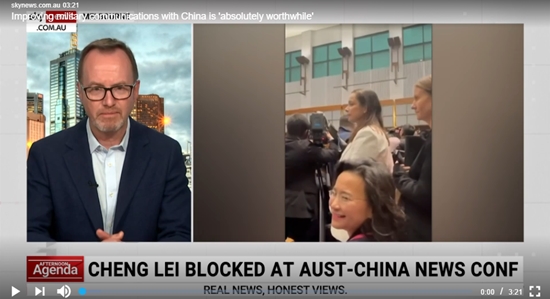
After imprisoning Chinese-born Australian TV journalist Cheng Lei for three years on phony charges, the least the Chinese government and its lackeys could do is leave her alone to do her work in Australia. But the Chinese Communist Party, enemy of civilized norms, goes out of its way to avoid doing even the least it can or should do.
China for the block
And so, some eight months after she had been released from a Chinese prison, “Chinese media officials attempted to block Australian journalist Cheng Lei from appearing on camera during a press conference with [China’s] second-most powerful leader,” the Daily Mail reports (“Cheng Lei blocked off by Chinese media officials as Li Qiang visits Australia,” June 16, 2024).
Video footage appears to show an embassy official attempting to move in front of Ms Lei to block her from the view of cameras at a press conference in Parliament House on Monday where Prime Minister Anthony Albanese was appearing alongside China’s second-in-command Premier Li Qiang.
The official refused repeated polite requests to move.
After being rebuffed, an Australian parliament official then demanded: ‘You’re standing in front of my Australian colleague—you must move.’
Another journalist then offered to swap seats with Ms Lei, which allowed her to move two seats to the right.
But then another Chinese embassy official attempted to get close to her to block her view.
At this, an Australian official responded by physically wedging herself between Ms Lei and the Chinese officials to shield the Sky News presenter….
The whole bizarre interaction lasted the length of the 20-minute press conference.
This is small but telling instance of “transnational repression,” the clunky but standard term for government-sponsored harassment of nationals and other individuals who reside in foreign lands. China is hardly the only practitioner, only the apparently most ardent one.
Presumably, the Chinese blockers and tacklers at the press conference were worried about the questions Cheng Lei might raise, maybe something about China’s human rights record or some such, the sort of thing with which she has direct experience.
Lei herself suggested that Chinese officials were worried that the visibility of someone like her might disrupt the “friendly facade” that they try to stage at such events. But their elephantine efforts to stop her from saying something that would create “a bad look” was, she noted, “in itself was a bad look.”
Didn’t see
The Li Qiang–approved maneuvering of China’s contingent of press-conference thugs may have been obvious, but not so obvious that it could be detected by Australian Prime Minister Albanese, who later told reporters “I didn’t see that.” However, “I saw Cheng Lei and we smiled at each other during the event.” On the other hand, “it’s important that people be allowed to participate fully and that’s what should happen in this building and anywhere else in Australia.”
This seems to cover all the bases. Didn’t see, exchanged smiles, everyone should be able to participate.
Whether or not Albanese observed the conduct of the Chinese at the press conference—as he must have, if it continued for twenty minutes and he was positioned in such a way as to be able to exchange smiles with Cheng Lei—his bland generalities are disingenuous in the extreme. The Australian prime minister should be telling Australia and the world that “this is the behavior of punks, not diplomats and statesmen.”
Albanese makes a slightly better impression in another story, one that reports his rejection of the Chinese premier’s “call to shelve disputes” during their upcoming meeting. According to “speech notes” viewed by the Brisbane Times, Albanese would soon be publicly confirming that China and Australia “won’t always agree, and the points in which we disagree won’t simply disappear if we leave them in silence.”
But what happens after the disagreements are aired?
One of the various disagreements doubtless pertains to “recent dangerous military encounters between the Chinese and Australian militaries.”
A member of the Australian Senate, David Shoebridge, agrees with Prime Minister Albanese’s call for “better military-to-military communication” with China. “Improving lines of communication, opening up lines of communication, and if that prevents these kinds of incidents from happening again, well, I think that’s absolutely worthwhile.”
Tell China
Just, you know, communicate with China to let them know, hey, FYI, we don’t want you shooting at us.
One of the said incidents occurred in May 2024 when “Chinese fighter jet endangered an Australian navy helicopter with flares over international waters….” The chopper had to scramble to get out of the way.
Albanese said at the time: “We’ve just made it very clear to China that this is unprofessional and that it’s unacceptable. We’ve made it very clear…through all of our channels, at all measures at our disposal, including here publicly.”
Communication made. Problem solved? But a lot of communications have been made to China by the many nearby countries that China periodically graces with unprovoked military incidents.
Also see:
StopTheChinazis.org: “China, the Crazy Neighbor Who Just Won’t Leave People Alone”
”If someone in your town were harassing no fewer than 15 of your neighbors, what would you call that person? Eccentric? Irritable? Crazy? Dangerous?… The risks of testing China’s will to escalate may not be as great as we think.”





